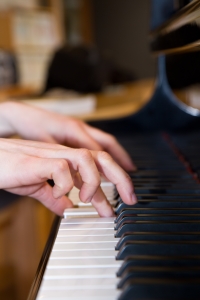Re-learning the piano

I used to play the piano at school. Or rather… when I was very very mini I bullied my parents into letting me learn piano, and they agreed, and for a few years I slogged through the exams but didn’t really practice very much unless I liked the piece until one day, when I was about 13 years old, my piano teacher said:
“So now you’ve got Grade 5 piano, I suppose we should get the theory exam done.”
Alas: no one could progress beyond Grade 5 in any instrument, without also doing theory. I groaned – theory meant more time staying late at school, and as I had a commute that was an hour and a half long, this idea didn’t seem appealing.
“Couldn’t I just not do Grade 6?” I asked.
She looked aghast. “But you’ve got to keep going with the exams! Isn’t that what your parents want?”
I thought about this. My parents, when I did Grade 5 violin, were astonished to discover the exam was even happening. “What grade is this?” asked Dad, as he gave me a lift down to the exam hall. “Is it good?”
“I don’t think my parents know what grade I am,” I admitted, “And even if they do, they don’t hugely care. They want me to enjoy music.”
My piano teacher’s face, already surprised, erupted into astonishment. “They don’t care what grade you are?! But… that’s just…”
That’s not how my school works, she nearly said. A great many talented students who loved music were at my school, but a great many more students who couldn’t wait to give up oboe or piano or speech and drama or whatever else their parents had decided was a Good Thing, haunted the early-morning corridors of the music block. Which isn’t to judge the parents per se: I get how these things are useful. Though of course, utility’s progress is dented, if there isn’t any joy.
From that day forth, however, we stopped doing exams. We stopped caring about them. And suddenly, two things happened. Firstly, I began to absolutely love my piano teacher, which hadn’t really happened until then. Secondly, my piano playing skills rocketed. I actually started practicing. To this day I can remember lots of fiddly bits (though sadly, not so many easy bits) and playing the piano became a default thing I did for happiness. When I left school, I promised I’d keep up with it, and did as much as I could at LSE, tinkling here or there where I could. However, at university, the simple problem became finding a piano. LSE had two accessible that I knew of – a music room that you had to reserve, and was usually filled with music scholars rather than tinkling amateurs like myself – and a piano in a small room in my first year hall of residence that you could only use during certain prescribed hours. By my third year, getting my hands on a piano was becoming… problematic.
RADA had a better supply of pianos, but alas, they were all in the actor’s side of the campus. Only one piano resided in the technician’s wing, and it was supposed to be used by actors anyway, though I got to play with it most weeks as actors rarely came over to our corner unless actually performing in something. However, it was a piano in a corridor – not a great place to practice – and I had at most, a lunch and a dinner break, sometimes neither, in which to tinkle, when I could, when I wasn’t too physically exhausted or working through.
In short: my piano playing suffered. For years I toyed with buying something for myself, but pianos are ridiculously expensive and I wanted to save up. I ended up saving for five years, partly owing to my abject terror of spending money (no one knows where the next cheque is coming from in either writing or lighting), partly because I had a neighbour in my last flat who… I didn’t want to provoke, shall we say.
Now, at the time of writing this blog, I own a digital piano. It was refurbished by a man in Harringay who buys up unwanted pianos, cleans them up, and boots them back onto the market at half price. It is a beautiful thing. The touch is light enough to twinkle on but heavy enough you can feel the changes when you start to go full strength. It has a lovely sound that changes in quality, as well as tone, when you move along the scale. It came with a matching piano stool. I am delighted.
I am also unbelievably rusty. In fairness, it’s coming back, but more importantly, my teacher teaching me how to learn is coming back. It’s a humbling reminder of the fact that yes, I could just sit down and read notes while counting rhythmically, but actually even a little time spent with a teacher is greater than a world of good intention and intelligence. I remember to break things down – one hand, the other hand – to piece things together slowly – to annotate fingering – to circle areas where I might go wrong – sneaky key changes, cunningly obscure double sharps, bits of bollocksy rhythm etc.. Currently I’m trying to learn how to do triplets in the left hand, and semi-quavers in the right. I play bar after bar after bar, speeding up slowly, and slowly – so slowly – it starts to come back. I can forget where I am for hours, and when it works, it’s a massive buzz.
A friend once asked me how I stayed calm under stressful circumstances. I gave my usual answers – I write books in which I express my rage on fictional forms, and I practice a violent martial art in which I learn to move with physical control. Also, as a side-bar, getting angry just never seemed to help anyone.
Now, however, I have something new, not exactly different, but definitely good, to add to my source of things that give me joy. I’ve got a piano, and it is wonderful.





